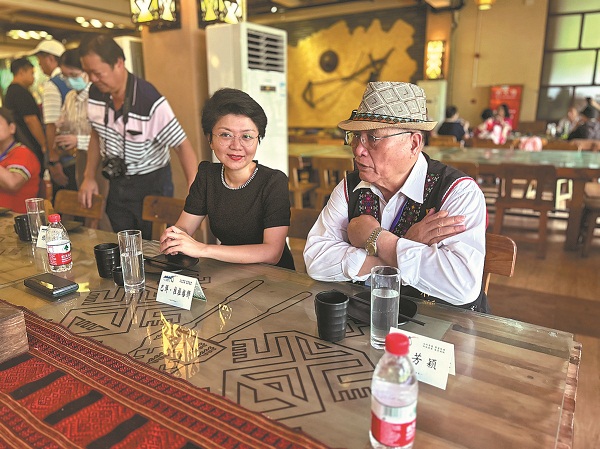
Liu Fangying (middle) chats at a meeting. CHINA DAILY
Liu Fangying, delegate to the 20th National Congress of the Communist Party of China and vice-president of the Hainan Taiwan Compatriots Association
Over the past 30 years, agricultural cooperation between Hainan province and Taiwan has flourished, developing into a mutually beneficial relationship.
The first phase, from the late 1980s to the late 2000s, primarily saw grassroots and self-initiated exchanges between the two regions.
Hainan's land area is comparable to Taiwan's, but with more plains and fewer hills, while Hainan's climate is similar to Taiwan's, making it an attractive place for Taiwan residents.
From 2009 to 2018, this stage saw the introduction of various agritourism business models, such as homestays and sightseeing. During this period, Taiwan managers and technical experts contributed to Hainan's agricultural development by introducing new crop varieties and precise management techniques.
The establishment of the Hainan Free Trade Port in 2018 brought new opportunities for the development of agriculture on the island.
Initially, Taiwan farmers were attracted to Hainan because of its abundant land, flat terrain, low rent costs and similar subtropical climate.
However, with the establishment of the Hainan Free Trade Port, market-oriented policies have become the primary draw for Taiwan farmers. Many Taiwan investors and entrepreneurs view this as a once-in-a-century opportunity for Hainan's agricultural development.
Despite the current high price of land in Hainan, many Taiwan investors continue to seek advice on, and invest in, Hainan's agricultural sector.
The Hainan Free Trade Port, backed by the vast potential of the mainland market, has strong appeal for investors and entrepreneurs looking to capitalize on the island's agricultural opportunities.
As the agricultural industry continues to evolve, we are seeing increasing diversification of the type of businesses. That encompasses fisheries, seed production, animal feed, food processing, international trade and logistics centers.
In recent years, Taiwan businesspeople have introduced, cultivated and promoted various crops and animal species in Hainan, including pineapples, sugar apples and durians. They have gained a significant reputation for quality, leading to a continuous rise in demand.
Many Taiwan businesspeople have applied scientific and technological management methods to the process of seedling research and development, and to the management of planting and breeding.
They are deeply involved in rural vitalization projects, including the promotion of high-quality fruit, providing technical and professional training. They also buy large amounts of fruit and vegetables from Hainan's farmers for processing.
A series of supportive measures have been put in place to help Taiwan people develop Hainan's agricultural sector. To further support businesses and address disputes with Taiwan enterprises, a mediation mechanism has been established to facilitate an effective business environment.
Efforts will be made to continue to support Taiwan compatriots and enterprises to participate in the mainland's rural vitalization and the development of Hainan's free trade port.